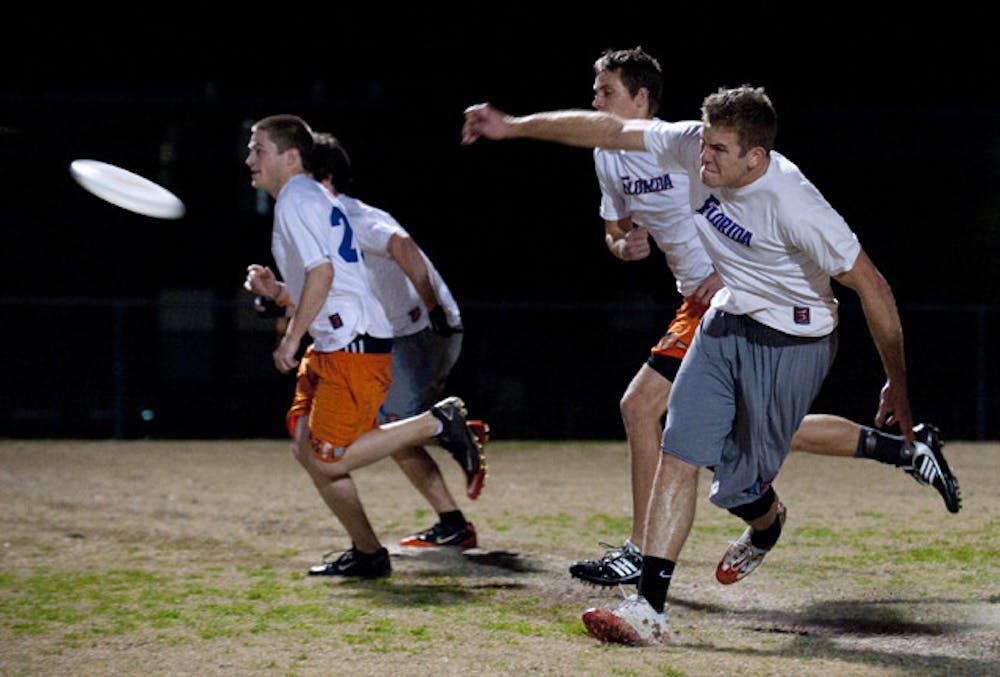When the UF ultimate team gathered to practice Wednesday evening, the most obvious element of its game was missing.
Just three days before their first tournament of the semester, the Gators didn’t even utter the word “Frisbee.”
They may have thought it — as in, “Damn, I really wish we were throwing a Frisbee right now because this track sucks.” But still, Wednesday’s ultimate practice was not about Frisbee, as ironic as that sounds.
Sure, this doesn’t seem so rare at first. The football team starts spring practice March 16, but it isn’t exactly resting right now. The basketball team doesn’t show up to the court on game day and hope its shots are on.
But this is ultimate. And that’s the point.
“At Florida, we’re trying to show this is a real sport,” said Nate Sage, an accounting graduate student who came to UF because of its ultimate program. “There’s a lot of schools out there who don’t take ultimate seriously. They’re like, ‘Hey man, let’s just have fun. Let’s smoke weed and go out on the field barefoot.’ No. We want to be taken seriously. We’re not just a bunch of hippies who want to throw a disc around.”
So, here they are at Percy Beard Track, warming up for a 20-team tournament this weekend in Tuscaloosa, Ala., with a mile run, calisthenics and sprints — killing the hippie dream.
If you play four-square at Turlington Plaza or Humans vs. Zombies, clutch your games tight before someone shows up and replaces your bong hits with sprints.
Florida will need all the time on a track it can get — about half the team will, at least. Captain Cole Sullivan expects between 10 and 14 players of the 24 listed on the Gators’ roster to see the field in close games.
Of that handful of players, Sullivan said only three or four will actually have the disc thrown to them. In the ultimate community, this is UF’s trademark: identify the best players, get them the disc, lather, rinse, repeat.
There is no “I” in team, but there is one in ultimate.
“We have the most unique system in the nation,” said Sullivan, a UF law student. “We recruit athletes. We have some of the tallest players in the nation. We’re going to have the best three players in the nation, and we’re going to get them the disc.”
Florida’s offense runs through those three best players in the nation. Last season, Sullivan said, the Gators ran isolations almost every play. Five players would run to one side, one player would run to the other, and Florida would try to simply out-athlete its opponent.
Remember your old rec basketball coach who thought his son was the next Kobe? This is the system he dreamed about. But it works.
In last year’s title game, Florida only used 10 players — three offensive specialists, three defensive specialists and four players going both ways. Carleton College, the Gators’ opponent, rotated 17 players. UF won 15-12.
The national championship was Florida’s second in five years. The Gators have finished in the top five at nationals four times during that stretch, putting them on par with Urban Meyer’s dynasty, minus about 90,000 fans.
This isn’t to suggest Florida is run by a bunch of me-first players who lack chemistry. In fact, Sage compared the team to a fraternity and said it is tighter than his old squad at Azusa Pacific, where he played as an undergrad.
Florida found a market inefficiency. Perhaps more than any other sport, ultimate teams experience a serious drop-off after their best three or four players. Similar to other club teams like men’s soccer and table tennis, the athletes have grown up playing their sport.
That’s not the case in ultimate. Florida added seven new players to the team this year. None of them had ever played competitively.
“I really like it, but I was never as intense as these guys,” said Cody Johns, a junior English major who just joined this year. “These guys are… wow.”
Senior Alex Hill is the only player on the team who played in high school. For the most part, that’s the consensus across the country.
When Florida captains recruit new players, they don’t look for Frisbee skills. Ideally, they want to find kids who played more popular sports in high school and were not quite good enough for Division-I scholarships.
These former cornerbacks and forwards will need about two years to adjust, learning to command a Frisbee like they used to a ball and understanding set plays. But while they learn, other former high school stars shine.
Sullivan and fellow captain Alton Gaines were recruited while playing ultimate with friends their freshman years. Sullivan played receiver at Vero Beach High. Gaines pitched.
“When we recruit you, we don’t care about how good you are now,” said Gaines, a business management graduate student. “We care about how good you are going to be two years from now.”
Sullivan said he didn’t play his first two years on the team. Now a senior on the defending national champion, it’s his job to turn raw talent like his former self into actual players.
Players who may or may not touch the disc much come game time, but players who will have as good a chance as any to touch a gold medal at season’s end.






